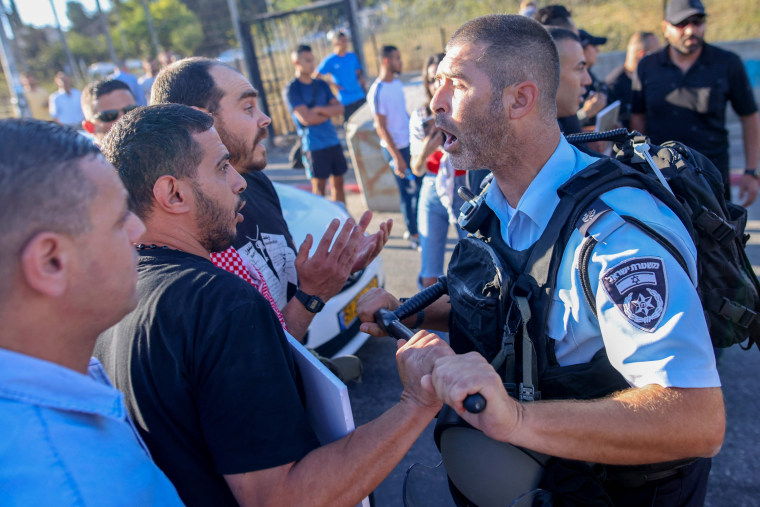JERUSALEM — Israel’s Supreme Court Monday proposed a compromise in a case that threatened to see four Palestinian families evicted from their homes in the sensitive east Jerusalem neighborhood of Sheikh Jarrah.
The proposed workaround to the controversial case, which helped trigger Israel’s 11-day war with Hamas, is to give families threatened with eviction protected tenancy allowing them to stay in their homes in Sheikh Jarrah.
The compromise does not, however, grant these residents ownership over their homes meaning the threat of dispossession could still hang over them.

The court has given Palestinian residents seven days to present a list of names for protected tenancy, effectively giving them a week to consider whether to accept the compromise. It remains unclear which generations of families would be considered protected tenets.
“It was a long session,” said Sami Ershaid, a lawyer for the Palestinian families following the hearing. “There is no date for the decision that the court will issue.”
The position of the Jewish settlers with regards to the proposed compromise was not immediately clear.
The Sheikh Jarrah neighborhood is a long-time flashpoint in the Israeli-Palestinian conflict.
Palestinian families have lived in the area for decades, but Jewish settlers say the land the houses were built on was originally owned by Jewish organizations before 1948, when fighting divided Jerusalem into east and west.
A law passed by Israel’s parliament in 1970 allows for property previously owned by Jewish people in east Jerusalem to be reclaimed, although Palestinians have no such right to reclaim property in west Jerusalem.
The four Palestinian families in Sheikh Jarrah are facing imminent eviction on the basis of that law.
In the hearing Monday, the Palestinian families requested to appeal a previous decision by the Israeli Court of Appeal that ruled in favor of Jewish settlers. It was due to be heard in May but was postponed amid protests that merged with demonstrations over policing at a compound sacred to Muslims and Jews known as the Temple Mount or the Noble Sanctuary.
Having warned Israel to halt the evictions and withdraw from the holy site, Hamas then fired rockets at Jerusalem on May 10 setting off 11-days of fighting between Israel and the militant group that controls Gaza.
Download the NBC News app for breaking news and politics
“If they decide to evict us 14 people in my family will be out on the street,” Abed Alfatah Skafi, whose family is one of the four threatened with eviction in the case heard by the Supreme Court, said before the hearing started Monday.
“It will be a disaster, all our memories, our children grew up there,” added Skafi, 70, in an interview with NBC News.
The threatened evictions have been widely criticized by rights groups and President Joe Biden's administration has repeatedly said it is "very concerned."
“We are also deeply concerned about the potential eviction of Palestinian families in Sheikh Jarrah … many of whom have lived in their homes for generations,” Ned Price, a spokesman for the State Department said in a statement issued amid violence in Jerusalem that helped spark the conflict in May. “We also urge the authorities to approach the residents of Sheikh Jarrah with compassion and respect.”
Israel captured east Jerusalem, home to holy sites that are sacred to Jews, Muslims and Christians, in the 1967 Mideast war. It later annexed the area in a move not recognized internationally. Israel views the whole city as its capital, while Palestinians want east Jerusalem as the capital of a future Palestinian state.
Saphora Smith reported from London. Lawahez Jabari reported from Jerusalem.